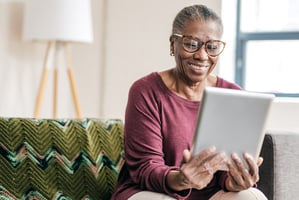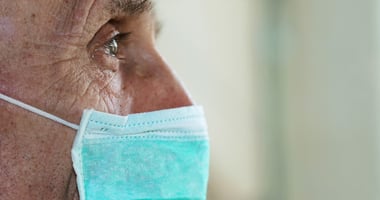Connecting With Older Adults by Phone May Reduce Loneliness, Depression, Anxiety During Pandemic

Older adults who received regular phone calls from a young adult a few months into the COVID-19 pandemic experienced greater improvements in loneliness, depression, and anxiety after four weeks compared with older adults who did not receive these calls. The findings were published today in JAMA Psychiatry.
“The use of lay callers, deliberate but brief approach on training, and the use of ubiquitous telephones made the approach easily deployable and scalable,” wrote Maninder K. Kahlon, Ph.D., of the University of Texas at Austin and colleagues.
The study included 240 participants aged 27 to 101 who were homebound, had at least one chronic condition, and were receiving services for food through Meals on Wheels Central Texas. More than 60% of the participants were at least 65 years, 56% were living alone, 79% were women, 39% identified as Black or African American, and 22% identified as Hispanic or Latino. The participants were randomly assigned to receive phone calls from the same volunteer for a four-week period (intervention group) or no calls until after the four-week follow-up (control group).
The volunteers, aged 17 to 23, attended one hour of training by videoconference on how to engage participants in conversation on topics of their choice and were asked to watch less than one hour of videotaped instructions on the program. For the first five days of the program, the volunteers called all participants every day at the time they requested. After the first week, the participants also chose the frequency of calls, with a minimum of two and maximum of five a week. According to the researchers, most participants chose to be called five times a week.
Kahlon and colleagues evaluated the participants on measures of loneliness (including the UCLA Loneliness Scale), depression (eight-item Patient Health Questionnaire for Depression, or PHQ-8), anxiety (Generalized Anxiety Disorder scale, or GAD-7), and more at the beginning of the study as well as four weeks later.
Participants in the intervention group improved from a mean of 6.5 to 5.2 on the UCLA Loneliness Scale and in the control group, from 6.5 to 6.3. Depression decreased from a mean of 6.3 to 4.8 on the PHQ-8, and in the control arm, increased from a mean of 6.2 to 6.3. For participants in the intervention group, anxiety decreased from a mean of 5.9 to 4.1 on the GAD-7, and in the control arm, increased from a mean of 5.8 to 6.0.
Kahlon and colleagues noted that additional studies are needed to assess whether the participants continued to experience benefits after the program ended and/or if a longer program would lead to greater improvements. “Additionally, future research might explore the effect of this program when participants are screened for mental health conditions or stratified based on age,” they added. “It may be particularly interesting to assess whether the program can play a protective role for those at risk of clinical anxiety or depression.”
For related information, see the Psychiatric News article “COVID-19 Guidance to Help Our Patients and Ourselves.”
(Image: iStock/Wavebreakmedia)
Don't miss out! To learn about newly posted articles in Psychiatric News, please sign up here.






